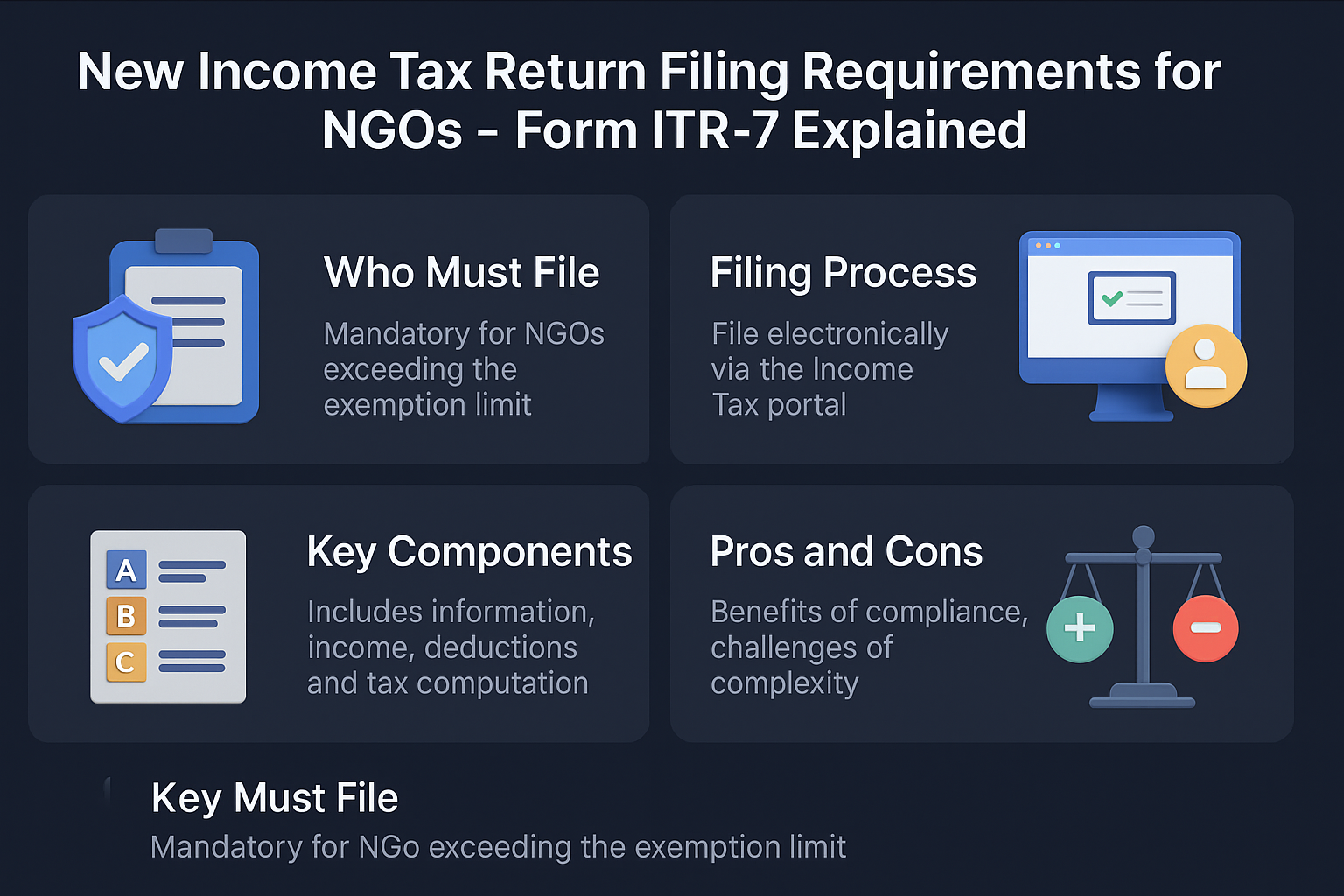
New Income Tax Return Filing Requirements for NGOs
– Form ITR-7 Explained
Legal Framework
Section 139(4A)/(4B)/(4C)/(4D) of the Income Tax Act, 1961, mandates NGOs with income exceeding the basic exemption limit (2.5 lakhs for AY 2025-26) to file income tax returns using Form ITR-7. This form is designed for trusts, societies, and other entities eligible for tax exemptions under Sections 11, 12, or 10(23C).
Who Must File
Form ITR-7 applies to charitable trusts, religious institutions, political parties, and other specified entities, including those claiming exemptions under Section 11 or Section 10(23C). Filing is mandatory even if income is exempt, to maintain tax benefits.
Example: ”Art for All,” a trust promoting cultural activities, earns 3 lakhs in FY 2024-25, exceeding the exemption limit. It must file ITR-7 by October 31, 2025, due to audit requirements.
Due Dates
Filing Process
The filing process is electronic, conducted via the Income Tax portal:
Key Component
Pros and Cons
Pros:
Cons:
Recent Updates (2025)
For AY 2025-26, notified on May 11, 2025, ITR-7 includes changes in capital gains reporting. NGOs must separately disclose capital gains before and after July 23, 2024, with options for the old (20% with indexation) or new (12.5% without indexation) long-term capital gains (LTCG) regimes for real estate, impacting trusts with property transactions (What’s new in ITR-7 for AY 2025-26).
Table 5: ITR-7 Key Components
| Part | Description |
| Part A | General NGO information |
| Part B | Income from various sources |
| Part C | Deductions and exemptions |
| Part D | Tax computation |
Conclusion
Compliance with FCRA and Income Tax regulations is not only a legal necessity but also a cornerstone of operational integrity for NGOs in India. By meticulously following the procedures outlined for FCRA registration, annual returns, donation reporting, bookkeeping, and income tax filing, NGOs can ensure transparency, maintain tax exemptions, and build trust with donors and stakeholders. The recent updates for 2025, including FCRA flexibility and ITR-7 changes, further underscore the importance of staying informed to navigate the evolving regulatory landscape effectively.
How to File Annual Returns Under FCRA (Form FC-4) 3.1 Legal Framework Section 19 of t...
Government Grants: An Exhaustive Analysis Under Income Tax Law and Ind AS Framework Government...
Understanding Societies in India: Formation, Governance, and Legal Framework Introduc...
Should Political Funding Be Allowed Through NGOs? – Legal Loopholes, Risks & Reforms &...
The rules and regulations that govern the functioning and operations of an Association of Persons ...
Corpus Donations: Legal Definition & Practical Use What is a Corpus Donation? A c...
A Comprehensive Guide to Social Audit in India In the modern era, citizens have become ...
Income from Business by NGOs: Section 11(4A) Explained Legal Framework (Sections 11(4) and 11(4A...
Detailed Procedure for FCRA Registration and Renewal (Form FC-3A & FC-3C) Introdu...
Understanding Charitable Trusts in India In India, the most commonly understood form of constitut...